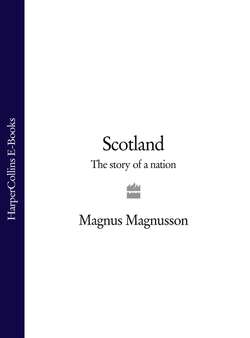Читать книгу Scotland: The Story of a Nation - Magnus Magnusson - Страница 32
Chapter 4 MACBETH (r.1040–57)
Оглавление… the three old women went and stood by the wayside, in a great moor or heath near Forres, and waited till Macbeth came up. And then, stepping before him as he was marching at the head of his soldiers, the first woman said, ‘All hail, Macbeth – hail to thee, Thane of Glamis.’ The second said, ‘All hail, Macbeth – hail to thee, Thane of Cawdor.’ Then the third, wishing to pay him a higher compliment than the other two, said, ‘All hail, Macbeth, that shalt be King of Scotland.’
TALES OF A GRANDFATHER, CHAPTER II
The little village of Lumphanan, in Aberdeenshire, lies about fifty kilometres to the west of Aberdeen. It is not as celebrated a name in the Macbeth chronicle as Birnam Wood or Dunsinane Hill in Perthshire, or Forres in Moray, but in fact it is much more significant – because it was at Lumphanan that Macbeth (the historical Macbeth, not the Macbeth of Shakespeare’s ‘Scottish play’) met his death in the year 1057.
What Shakespeare did for Macbeth was to make him perhaps the best known, and certainly the most notorious, character in Scottish history – but at appalling cost to historical veracity. Yet so persuasive is the story, so compelling is the skill of the playwright, so powerful is the characterisation of a noble soul seduced by ambition (and by a ferocious harpy of a wife), that everyone knows it and believes it.
Oddly enough, Sir Walter Scott gave it his imprimatur, too. In his Tales of a Grandfather he related the Shakespeare version wholesale, with some additional embroidery of his own. The puzzle is that Scott knew perfectly well that it was a travesty of events; indeed, in his History of Scotland (1829–30), which he wrote as a spin-off from Tales of a Grandfather, he gave a very different and much more soberly accurate account. Yet in the Tales he preferred to entertain his grandson rather than to educate him. It is a dilemma which faces every ‘popular’ historian.
According to Shakespeare (and the Tales of a Grandfather), Macbeth was a trusted general of the venerable and much-loved King Duncan I of Scotland. With his fellow-general Banquo, Macbeth quells an insurrection and defeats a major viking invasion in Fife. On his way home, on a ‘blasted heath’ near Forres, he encounters three witches. The first addresses him as Thane of Glamis (a title which he has just inherited). The second addresses him as Thane of Cawdor (which Duncan has just named him, although Macbeth does not know it yet). The third, ominously, addresses him as ‘Macbeth! that shalt be king hereafter!’ For Banquo, they promise less in the immediate future but much more to come: ‘Thou shalt get kings, though thou be none.’
Soon afterwards, messengers arrive to announce that Macbeth is to receive the title and possessions of the Thane of Cawdor, who had been a traitor in the rebellion and is shortly to be executed. Macbeth is thunderstruck: ‘Two truths are told,/as happy prologues to the swelling act/of the imperial theme’.
According to Shakespeare, Macbeth now writes a letter to his wife telling her of his encounter with the witches, and sends notice that the king himself is coming to stay with them at their castle at Inverness. Lady Macbeth works on her husband’s latent ambition and incites him to kill the king – which he does, albeit unnerved by the deed.1 Duncan’s two young sons, Malcolm (the Prince of Cumbria) and Donalbain, fearful of suffering the same fate, flee the country.
Macbeth thereupon assumes the crown. Mindful of the witches’ prophecy that Banquo will be the progenitor of future kings of Scotland, Macbeth sends hired assassins to kill Banquo and his young son Fleance; Banquo is struck down, but Fleance escapes, and his progeny later become the ruling Stewart dynasty of Scotland.
Macbeth now embarks on a reign of terror. He consults the witches again, and they warn him to beware of Macduff, the Thane of Fife. But they also tell him that ‘none of woman born’ will ever harm him, and that he ‘shall never vanquished be, until/Great Birnam wood to high Dunsinane hill/Shall come against him.’
Before Macbeth has time to act, Macduff, suspecting that he is next on the king’s hit-list, flees to England to join Duncan’s son Malcolm. In thwarted fury Macbeth sends his assassins to Macduff’s castle in Fife and has Macduff’s wife and young family slaughtered.
At the English court the Scottish refugees, spurred on by Macduff’s arrival, assemble an army with English help and invade Scotland. To hide their advance towards the tyrant’s lair at Dunsinane Castle they camouflage themselves with branches cut from Birnam Wood. Macbeth is shaken by the news that the wood seems to be coming to Dunsinane; he is even more dismayed when he faces the vengeful Macduff, who reveals that he was not ‘of woman born’, but had been ‘from his mother’s womb untimely ripp’d’. There is nothing left for Macbeth now but to die valiantly: ‘Lay on, Macduff; and damn’d be him that first cries, “Hold, enough!”’ Macbeth is duly slain by Macduff, who brings the tyrant’s head to Malcolm – the future Malcolm III, Malcolm Canmore.
